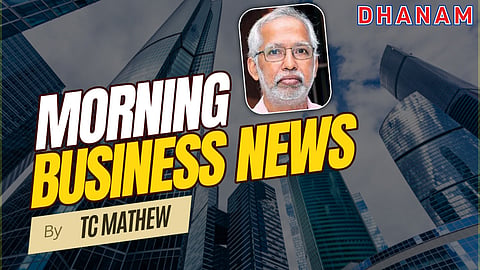

US President Donald Trump has escalated the trade war to a new level by imposing heavy tariffs on imported cars, trucks, and auto components. The new duties will come into effect on April 2. The announcement is expected to be followed by retaliatory tariffs from other countries. Reports also suggest that tariffs on pharmaceuticals and copper are in the pipeline.
As the global trade war heats up beyond earlier expectations, markets have responded with notable declines. US markets fell yesterday, and Asian markets followed suit this morning. Futures markets in the US are also trending lower. The Gift Nifty derivative index closed at 23,493.50 and opened higher at 23,504 but quickly dropped, indicating that the Indian stock market too may begin the day in the red.
European markets ended Wednesday’s session in negative territory, particularly hit by the news of impending US tariffs on vehicle imports, which dragged down auto stocks. Interestingly, UK markets found some support from government proposals to reduce budget spending, and a decline in inflation there also helped buoy sentiment.
However, global uncertainty and rising anxiety continue to pull down major indices. US markets closed just before the official announcement of the auto tariff, but the sentiment had already soured. Technology and automotive stocks bore the brunt, with Nvidia shares dropping by six percent. The fall was largely due to concerns that new Chinese regulations on chip exports may hurt sales. Tesla shares too slipped by six percent after weak sales data from Europe.
On Wednesday, the Dow Jones index fell by 132.71 points (0.31%) to close at 42,454.79. The S&P 500 lost 64.45 points (1.12%) to end at 5,712.20, while the Nasdaq Composite shed 372.84 points (2.04%) to settle at 17,899.01.
The new 25 percent tariff on all imported vehicles and auto parts prompted further decline in US futures, with the Dow, S&P, and Nasdaq futures falling by 0.18 percent, 0.24 percent, and 0.31 percent respectively. Asian markets also showed weakness, with indices in Japan, South Korea, and Australia down by nearly one percent. Chinese markets too opened lower.
Indian markets, after a positive opening on Wednesday, ended nearly one percent lower. The Sensex dropped from 78,167 to 77,194 and the Nifty declined from 23,736 to 23,451, with both indices closing below their respective key psychological support levels of 77,500 and 23,500.
Mid-cap and small-cap stocks were hit harder. All sectors except auto ended in the red, with public sector and private banks, realty, oil & gas, IT, media, pharma, and healthcare stocks seeing notable declines.
Foreign institutional investors (FIIs) were net buyers in the cash market to the tune of ₹2,240.55 crore, while domestic institutional investors (DIIs) sold shares worth ₹696.37 crore. Interestingly, FIIs have been heavily investing in government bonds recently, purchasing bonds worth ₹40,000 crore so far in March. This move is based on the expectation that the Reserve Bank of India may cut repo rates in April or June, potentially pushing up bond prices.
By close on Wednesday, the Nifty had lost 181.80 points (0.77%) to end at 23,486.85, and the Sensex declined by 728.69 points (0.93%) to settle at 77,288.50. The Bank Nifty dropped 398.95 points (0.77%) to close at 51,209. Mid-cap and small-cap indices also fell by 0.62 percent and 1.07 percent respectively.
Breadth in the broader market remained negative, with just 885 stocks advancing on the BSE, compared to 3,151 that declined. On the NSE, only 622 stocks gained while 2,303 lost ground. Market sentiment continues to weaken. If the Nifty loses support at 23,400, the next critical level to watch would be 23,200. For today, support is expected at 23,450 and 23,280, while resistance could be seen at 23,670 and 23,730.
In corporate news, Wipro secured a £500 million (₹5,500 crore) contract from UK-based retirement firm Phoenix Group, to be executed over ten years.
In defence, the Ministry of Defence awarded contracts worth ₹6,900 crore to Bharat Forge and Tata Advanced Systems for manufacturing artillery and gun-towing vehicles.
BSE Limited’s board is scheduled to meet on Sunday to decide on a bonus issue.
Meanwhile, LIC is reportedly preparing to acquire a 40 to 49 percent stake in ManipalCigna Health Insurance from the Manipal Group and US-based Cigna. Currently, Manipal holds 51 percent and Cigna holds 49 percent in the company. LIC’s entry into the health insurance space is expected to create significant ripples.
Larsen & Toubro also bagged a massive ₹15,000 crore contract from QatarEnergy to build offshore natural gas extraction, liquefaction, and compression platforms along with associated facilities.
Gold prices remain volatile amid a strong dollar and market uncertainty. On Wednesday, gold closed at $3,019.50 per ounce and climbed to $3,028.40 this morning. In Kerala, jewellery gold rose by ₹80 per sovereign to ₹65,560.
Silver, however, declined to $32.56 per ounce. The dollar index edged up slightly to close at 104.55 on Wednesday and is currently at 104.47.
The Indian rupee gained marginally yesterday, closing at ₹85.71 against the dollar after some fluctuations. China’s yuan continues to hover around 7.26 per US dollar.
Yields on US government bonds increased, with 10-year bonds offering a return of 4.354 percent.
Crude oil prices are on the rise as the ceasefire in Ukraine remains elusive. Brent crude closed at $73.79 per barrel yesterday and rose to $73.87 this morning. WTI crude is trading at $69.75, while UAE’s Murban crude reached $75.32.
Cryptocurrencies continue their downward trajectory. Bitcoin dropped by 1.5 percent to $86,720, and Ethereum fell by 3 percent, slipping below the $2,000 mark.